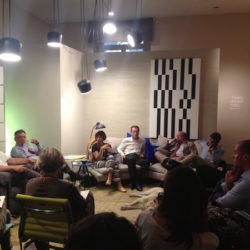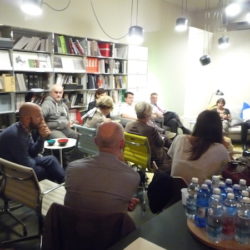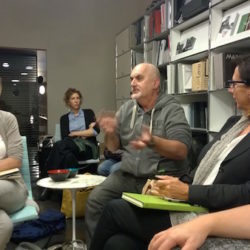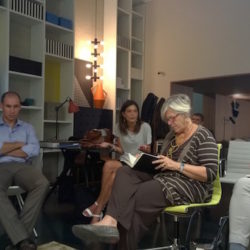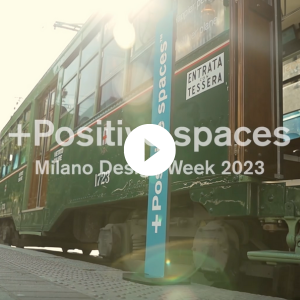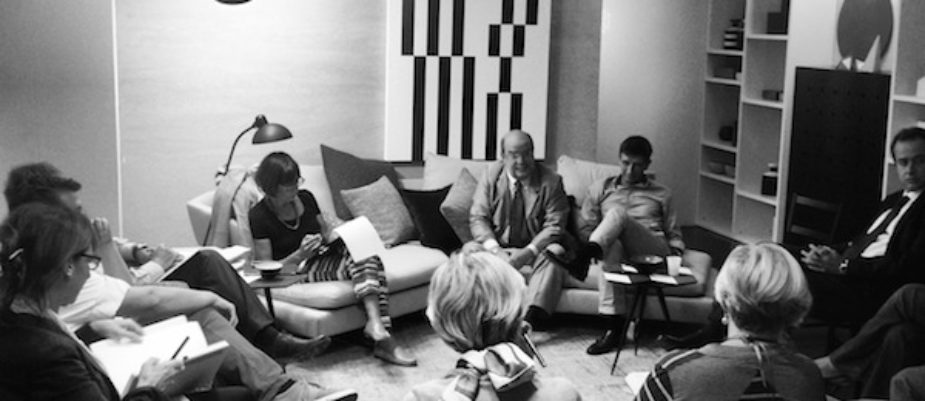
During the Jelly Session #8, at Spotti’s showroom in Milan, flexibility, adaptability, resilience, dynamic change, flexible design and organization, were the themes discussed.
The partnership with USM is not accidental, actually Modularity and Flexibility are at the root of the identity of this Swiss company, since Paul Schärer, grandson of the founder, decided in 1961 to boost the company and entrusted the design of the new office to the Swiss architect Fritz Haller, who shaped the building on a unique modular, structural framework in steel that, thanks to an innovative and flexible mind, inspired two years later the evergreen furniture USM Haller system now world-famous.
The Jelly Session starts with the reading of the participants’ tweets, the discussion is about the negative meaning, Weakness, of Latin and its use in all kinds of fields.
Can a company be considered as flexible when it can gear a current product to different situations or if it makes use of Just in Time production systems and flexible management systems?
Everybody agree that Flexibility isn’t synonymous with Freedom, but it’s a dynamic adaptation to changing situations.
Perhaps nowadays Resilience is the most appropriate term, to fit into a no longer foreseeable world, for things change at an unthinkable speed.
In the seventies we had an Aesthetics of Flexibility, but Modularity isn’t Flexibility: it’s the capability to find in-house resources to build a system meeting the new requirements .
Flexibility may be synonymous with Sustainability: a flexible design can prolong the life of the building.
Planning flexibility also means that the same logics cannot be imposed throughout the world. Often a poverty of planning ideas is passed off as Flexibility.
For example, in the case of “tender” lighting fittings in office buildings! Instead, if the Project is Flexible and makes a correct use of technologies, it can fit illumination to man correctly, not the other way around, and save energy, too.
Today a product must be flexible to adapt to people; for instance, different generations with different mentalities and different ways of working live and work in the same office.
Are such strict architecture and design projects partly imposed by the current regulations, which are to be strict to prevent their interpretation?
After all, simple rules and a structured space ensure flexibility. Flexibility is dynamic, lasting over time, only if the project is flexible.
Even in society it’s a balance constantly subject to stress. Again, we need a dynamic flexibility of business administration and a project meant to support it. Such a flexibility is made possible through an efficient infrastructure freeing us from physical restrictions, which is named Smart Working, however still hardly accepted by the management. Flexibility and Democratization are the emergent social and cultural trends, as proved by the new and really flexible generations with their lifestyles and workstyles.
Who did attend WOW! Jelly Session #8, organized with USM at Spotti’s showroom in Milan?
Mariarosa Ambroso,
Daniele Andriolo,
Matteo Artusi,
Michele Cardone,
Lella Castelli,
Alessia Cicuto,
Davide Fabio Colaci,
Gabriella Del Signore,
Silvia Fattore,
Antonio Gonella,
Antonina Gucciardi,
Mario Maccarini,
Paolo Mantero,
Lorenzo Maresca,
Cristian Minerva,
Michele Paparella,
Silvia Piardi,
Marco Predari,
Gianni Ronchetti,
Gianluigi Sacchetti,
Renata Sias,
Claudio Spotti,
Federica Zallone.

